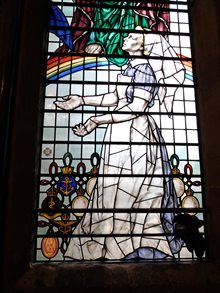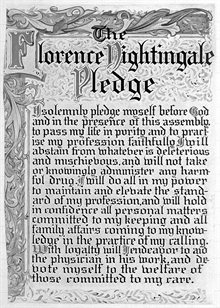This content is adapted from the Florence Nightingale Derbyshire Association’s Exhibition (2010)
The material in this section is not the result of research by the current project team, but rather is adapted from the Florence Nightingale Derbyshire Association’s 2010 Exhibition, which marked the 100th anniversary of the death of Nightingale and was displayed throughout August 2010 at the Gothic Warehouse, Cromford Wharf, part of the Derwent Valley Mills World Heritage site. An associated programme of music, dance, film and walking events were held throughout Derbyshire.
We would like to thank the Florence Nightingale Derbyshire Association for permission to reproduce these materials.
Legend and Legacy
Of all human sounds, I think the words 'I don't know' are the saddest.
- Florence Nightingale
The familiar image of Florence Nightingale is the ‘ministering angel’, the gentle nurse who tended the wounded and dying soldiers in Britain’s war in the Crimea in the 1850s.
But she was so much more than just the ‘Lady with the Lamp’. In her long life, Florence Nightingale was also a respected researcher, systems analyst and statistician.
She wrote books, designed hospitals, and pioneered the use of pie-charts to convey complex statistical information.
She campaigned tirelessly for public health reform, revolutionised military health-care systems, and transformed nursing care from an often drunken and deadly practice into a skilled, trained and disciplined profession.
She used her family status and connections to challenge traditional ways of doing things. She used her fame and her name to raise money for the causes that she fought for. And she used her intellect and learning to argue passionately for the changes that she knew would save lives.
Nursing Reform and International Reputation
Before the Crimea, standards in nursing practice were non-existent. Nurses were often drunk, and, as women used to seeing men in states of undress, there were regarded as little better than prostitutes.
Florence Nightingale made nursing a respectable vocation and a profession. The Nightingale Fund, started in 1860, raised £45,000 (around £2 million in today’s money) in a matter of months. From then on, nurses got a basic training, and were paid a basic wage while they were trained.
She also campaigned for district nurses, so that the sick could be cared for at home. Ideally, she argued, hospitals and workhouse infirmaries should be phased out altogether. She set up training for midwives, and conducted research into lying-ininstitutions and the particular health risks at childbirth.
She established systems for regulating nursing, in all its various disciplines. She set the standard that - to this day - govern professional nurses all over the world.
International Work
In her lifetime, Florence Nightingale's influence reached around the globe, to all far-flung corners of the British Empire - and beyond:
After the Indian Mutiny of 1857, she championed reform of sanitary conditions throughout the Raj. She devised questionnaires to go to all the military stations in India (the returned forms filled a whole room in her house!). She used the information to argue for change. Florence Nightingale advised five viceroys of India over the next forty years, but grew frustrated at the lack of progress: in 1878 she published a damning report that detailed the deaths of millions, because of government neglect. She had become a respected expert on healthcare conditions in India – without ever going there!
She researched into the poor health of aboriginal peoples, conducting studies in Australia and New Zealand, South Africa and Ceylon (now Sri Lanka). She linked children’s health to education, calling one school system ‘death by slow torture’.
In 1859 Florence Nightingale devised a set of questionnaire forms, which gave consistent medical information about hospital patients. These forms were presented to the International Statistical Congress in 1860, and adopted by all the governments represented.
She advised the government of the United States on medical standards in field hospitals in 1861, early in the American Civil War. In the same year she suggested the British government send reinforcements to Canada (then still a British colony) in case of invasion by the Americans.
She began to research into the average speed of dogsled teams - for transporting the wounded across snowy terrain - and the relative weights and warming capacities of animal skins.
Statistics
The mid-nineteenth century saw the birth and early years of statistics and statistical research.
Florence Nightingale’s work on medical practice and conditions in the Crimean hospitals proved for the first time that properly researched statistical information could be measured, interpreted and used to argue a case. She pioneered the use of ‘polar area diagrams’ (she also called them ‘coxscombs’, as they looked like the tufts on chickens’ heads!). Today we know them as pie-charts.
Florence Nightingale was the first woman to become a Fellow of the Royal Statistical Society in 1858. In the 1890s she planned to establish the Florence Nightingale Chair in Applied Statistics at Oxford University.
Religious Convictions
In 1850 Florence Nightingale wrote in her diary: "God called me in the morning and asked me would I do good for him alone - without reputation." It was one of many references to her calling.
She came to believe that every human being had an inner divine nature, which would be realised through the application of the laws of God - in government, legislation, institutions etc. God's laws were 'the laws of our moral progress.'
At the same time, she saw no conflict with the rational, scientific approach she brought to her work: she insisted that her skills with statistical analysis were a crucial part of her mystical and spiritual make-up. 'To understand God's thoughts', she said, 'we must study statistics, for these are the measure of His purpose.'
On principle, Florence Nightingale never preached openly about her faith in the course of her work, and she insisted that her nurses likewise kept their religious convictions to themselves.

Detail from the Nightingale window at Westminster Abbey. Photograph by Jonathan Memel, 2018 (CC BY-SA 3.0).
The International Red Cross
The International Red Cross movement was founded by a Swiss businessman called Henri Dunant. In 1864 he established the Geneva Convention, which confirmed the neutrality of all soldiers wounded in battle, and which still guarantees medical treatment by impartial Red Cross medics in warzones to this day.
In 1872, Henri Dunant wrote: "though I am known as founder of the Red Cross and originator of the Geneva Convention, it is to an Englishwoman that all the honour is due. What inspired me [...] was the work of Miss Florence Nightingale in the Crimea."
Florence Nightingale Today
Many new nurses make a promise when they first become nurses. This oath was introduced in 1893, and is still in use today. It includes promises such as: 'I will do all in my power to maintain and elevate the standard of my profession'. It's known as the Nightingale Pledge.
There are hospitals all over the world named after Florence Nightingale, including three in Istanbul. There are statues to Florence Nightingale all over the world, including three in Derby.
International Nurses Day is celebrated each year on 12th May - Florence Nightingale's birthday. The 12th May is also International Chronic Fatigue Syndrome Awareness Day, since many believe Florence Nightingale was an early sufferer from this condition.
Florence Nightingale has appeared on British £10 bank notes, establishing her as one of the nation's most famous icons.
On the planet Venus, there is even a corona (a land feature similar to a volcano) named after her - an honour normally reserved for mythical goddesses like Minerva and Athena!

'The Florence Nightingale Pledge'. Wellcome Collection, Creative Commons licence CC BY 4.0.